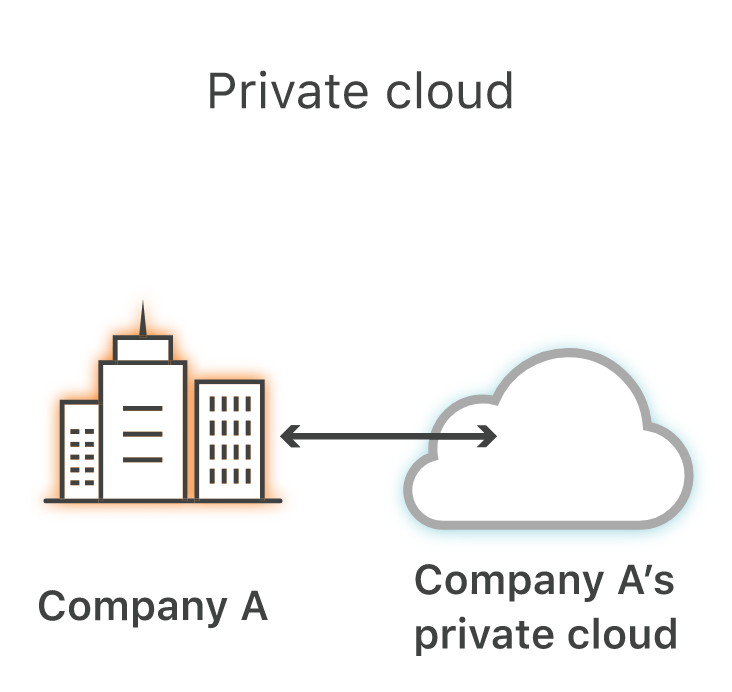Ever wonder why everyone is talking about Cloud Hosting these days? Is it something new that has baffled web enthusiasts around the globe? Back in the days, I thought it was an actual cloud holding a server. But Google helped me learn one or two things about it.

Let’s clear our heads first and understand what really is Cloud Hosting.
What is Cloud Hosting?
Cloud Hosting is a growing type of Web Hosting that spreads the data onto different servers, called Virtual Private Servers (VPS) or Virtual Machines (VMs). It consists of two parts: Server – that is the cloud server and network infrastructure to stay alive on the internet.

The important thing to remember about Cloud Hosting is its functionality and how it differs from already-existing web hosting types.
How Gen-Z has rediscovered the Cloud Hosting
Cloud Hosting is a two-sided coin. One side lets you host websites that are compatible, speedy, and reliable whereas the other keeps a good hold of the network altogether. The millennials, however, are prone to advancements and found the safest bet for hosting.

A single physical server distributing the data to multiple Virtual Servers to accommodate web hosting, application development, and remote-accessible desktop. Sound simple?
7 Reasons why you should use Cloud Hosting (Today)
Cloud Hosting has become a techno-niche for its:
- Flexibility – You can play around with data with more in-hand features
- Security – User-oriented security options with exceptional scalability
- Performance – Data transmission as fast as you want
- Pricing – Scalable, moderate, competent based on selected plans
- Model – Easy upgradation with practicable modifications
- Reliability – Fairly consistent multi-tenanted environment
- Scalability – Increase or reduce performance, functionality resources upon usage
And It’s simply awesome (thought I should include my reason too).
Cloud Hosting in Wonderland: A Tale of Two Worlds
No, I’m not going to talk about Alice’s Adventures in Wonderland, or how tremendous Johnny Depp was as Mad Hatter in the Alice in Wonderland (2010) movie, but rather shed some light on the benefits of having a Cloud Hosting. Sounds great?
Here are 8 benefits of Cloud Hosting that you should (definitely) know about:
1. Excellent Performance

Cloud Hosting servers evenly distribute the load of the website and its applications to all the connected servers on the network. Since it has independent physical servers, the resources availability stats are off the charts.
2. Brilliant Speed

With Cloud Hosting servers, you can expect to boost the website’s speed to 100 x times of what it was before (it may sound farfetched but it’s not). For this, it uses web simulator or web application accelerators such as Varnish, DAX, Nginx Azure SignalR Service, and many more.
3. Fairly Low-Priced

Unlike other web hosting practices in the market, Cloud Hosting will cost you as much as you want it to be – You pay for the resources that you use. Considering the features, you get with Cloud Hosting, the cost will seem within your means. Oh, and I forgot, you’ll get round-the-clock resource monitoring, fully managed hosting, and free data migration.
4. Vivid Data Security

It’s time you stop worrying about your data and let Cloud Hosting do its magic (and no by that, I don’t mean black magic). Cloud Hosting abides data mirroring protocols that mirror your data on various devices’ drives – So, if, God forbid, the hardware malfunctions or undergo failure, you won’t lose your data.
5. User-Friendly Scalability

Need to upgrade the Cloud Hosting system? It won’t be a problem as Cloud servers offer prompt upgradation for long-lasting improved scalability (RAM & CPU). So, upgrade the system next time when the website traffic increases.
6. Stable as a Rock

With Triple redundancy due to mirroring, all the data on the Cloud Hosting Server remains safe & unchanged (yes, that’s what I meant by stable as a rock). Recovering your data, in case of server failure, will not be a delinquent.
7. Dashboard Made Easy

An instinctual dashboard that allows users to easily monitor, track web hosting performance and add/remove resources upon need. Simple server management dashboard for users with no prior technical knowledge of Cloud Hosting Servers.
8. Tremendously Reliable

A Cloud-inspired infrastructure offering robust web hosting solutions, scalability, speed, and performance – Who wouldn’t want that much reliability? That’s why Cloud Hosting has become a standout amongst other types of web hosting.
Danyal Saleem, Founder & CEO at Value Hosted, added his two-cents to the subject (while I was discussing my payroll structure with him):
To understand the basics of Cloud Hosting, you have to understand what’s happening on the other side of the screen. Think from the user’s perspective and implement the Cloud model as it is.
But there’s one question that needs to be answered in a very non-geeky way.
How does Cloud Hosting work?
First, understand how a traditional web hosting works. When you host a website, your business and data reside on a single physical server (Dedicated Server Hosting) placed in a data centre.
In Cloud Hosting, your data has access to a cluster of Virtual Servers that operate in an instantaneous cloud virtual environment.

Therefore, if one server fails, other servers carry the load and execute the task. If there’s a need for more resources, the cloud server access the resource repository and upgrade without any technical hiccups. The same is the procedure when a website undergoes an increase in traffic.
**TIP**
Cloud Hosting services are not only used for just web hosting but you can utilize it for web applications, email marketing, and fast data storage & transmission.
What are the types of Cloud Hosting?
Presently, Cloud Hosting has conquered the web hosting market by offering four types of cloud services:
1. Public Cloud
Public Cloud web hosting is one of the most common types of cloud hosting used today. In this type, a user can easily configure features, resources via a user-friendly control panel (or in some cases RESTful API).

A user can effortlessly create a Cloud server without nerve-wracking about technical setbacks. Public Cloud comes with scalable One-click install applications that mostly (but not limited to) include:
- WordPress Hosting for Products & Services
- eCommerce, Forex Trading, Website
- Email Marketing Servers
- Cloud Storage, Backups, Sharing & Databases
- Remote Desktop Accessibility
- Virtual Environments
- LAMP, LEMP, cPanel/WHMCS etc.
2. Private Cloud
Private Cloud maintains much of what the Public Cloud offers except it comes with dedicated hardware and security features for a single organization. You will also get a custom-design cloud environment according to your company’s requirements. Private Cloud is best recommended to enterprises that cannot afford the downtime of any sort.

3. Hybrid Cloud
As the name should ring bells, Hybrid Cloud is an amalgamated Cloud Hosting of Public and Private Cloud. In this, users have maximum flexibility over to whichever type of Cloud deployment they want to utilize.

For sensitive and critical data workloads, a Private Cloud can be used; For less critical data and development, Public Cloud can be used. The best utilization example for Hybrid Cloud is Docker (Container Technology Software).
4. Community Cloud
Community Cloud is more like a collaborative Cloud Hosting that enables multiple organizations to share applications. Users residing in the same field or industry can operate within the compliance, performance, and security domain.
In simple, a Community Cloud is a privately managed Public Cloud that permits authorized users to work around the environment.
Apart from the aforesaid types, there are several Cloud Hosting types available but every third type (after Public & Private Cloud) comprises of the first two types. Therefore, it is best to stick with the functional definition of Public Cloud and Private.
Hosting a Website with Cloud Hosting
If you’re planning to switch from your current hosting plan to Cloud Hosting, then first do the following things:
- Evaluate needs for hosting migration
- Envision scalability, performance, reliability aspects
- Understand the benefits of Cloud Hosting before making a move to it
- Select a suitable Cloud Hosting plan after exploring available options
Top-Rated Cloud Infrastructure Providers
Cloud Hosting is merely a frontal-lobe of a giant set-up called Cloud Infrastructure that is keeping it altogether. Following are some of the well-liked Cloud Hosting providers in the world:
- Amazon Web Services (AWS)
- Google Cloud Platform (Google Computing Engine)
- Digital Ocean
- IBM Cloud
- VMware Cloud
- Microsoft Azure
- NaviSite
- OpenStack
- Cloudways
And many more.
Cloud Hosting: A change for a better future
Today, several small and large-scale techno-giants have diverted their business towards Cloud Hosting for better reasons. Companies like Google, Netflix, Amazon, Adobe Creative Cloud, Slack, Salesforce, Microsoft 365, and many others are prospering their way to the top.
Making the right move
Selecting the best hosting plan is not always a piece of cake. But with accurate guidelines and plentiful resources, it becomes much easier. Soon, Value Hosted will launch highly-anticipated Cloud Hosting services at fairly competent pricing plans. Our goal is to ensure that all existing and new customers get best, incomparable web hosting services 24/7.
If you have any questions or queries regarding web hosting, VPS hosting, Dedicated Servers, or Cloud Hosting, please feel free to come by to our support section to have a little chit-chat.
